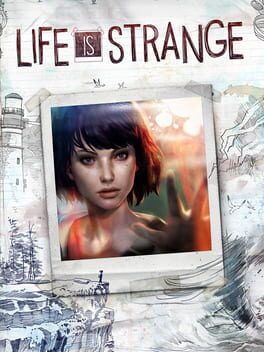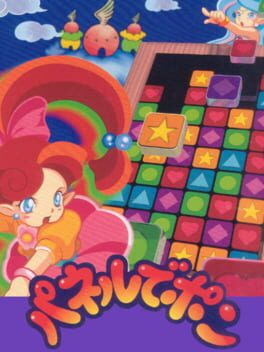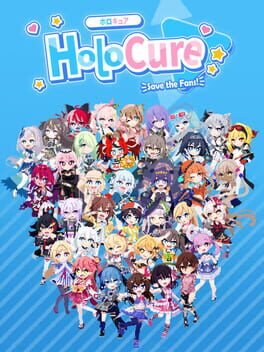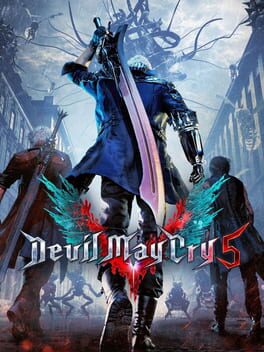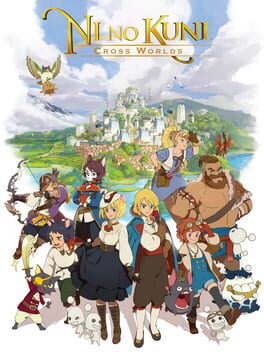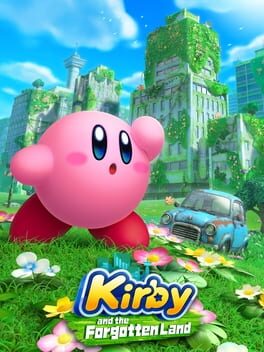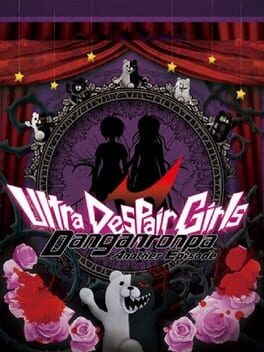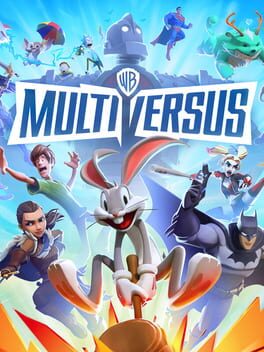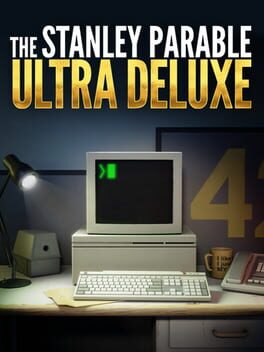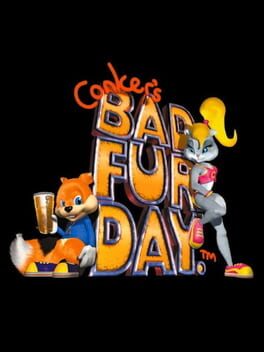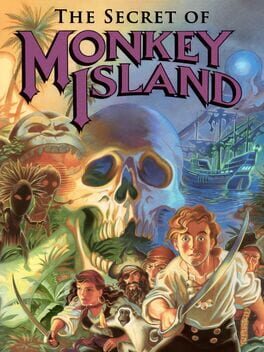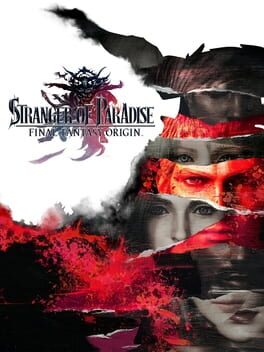thatonepersona
132 Reviews liked by thatonepersona
Life is Strange
2015
Panel de Pon
1995
if you played TETRIS ATTACK instead of PANEPON you have been played for an ABSOLUTE FOOL and i shall impress upon you the DEPTH OF YOUR FOLLY
TETRIS ATTACK is for PAWNS and BABIES, UNDERSTUDIES and BIT PLAYERS dancing to the tune of a MADMAN, PERVERSE AND EVIL, the landscape of PEAK 90'S ANIME AESTHETIC EXPUNGED and LEAVENED with LIES by THE FALSE IDOL, YOSHI
will you remain PREY TO HIS AMBITIONS? remain ENSLAVED to a SHAMBLING SHADE OF PERFECTION?
REAL ONES will answer NO
REAL ONES will play PANEPON
TETRIS ATTACK is for PAWNS and BABIES, UNDERSTUDIES and BIT PLAYERS dancing to the tune of a MADMAN, PERVERSE AND EVIL, the landscape of PEAK 90'S ANIME AESTHETIC EXPUNGED and LEAVENED with LIES by THE FALSE IDOL, YOSHI
will you remain PREY TO HIS AMBITIONS? remain ENSLAVED to a SHAMBLING SHADE OF PERFECTION?
REAL ONES will answer NO
REAL ONES will play PANEPON
Ape Escape 4
TBD
Devil May Cry 5
2019
I don’t want to talk TOO much about the part of Devil May Cry 5 where you PLAY it because, let’s be real here, you know, right? I’m late to this party. We all KNOW that this is simply one of the finest video game action achievements, the culmination of fifteen years of promise since DMC3 set us down this road. One of the few games with a modern AAA level of fidelity that by and large emulates the quick, snappy responsiveness of the PS2 era that grandfathered it. We’re all maybe a little sad to see the puzzle elements fully reduced to an aesthetic touch and the challenge dressing on levels discarded entirely (is this the first DMC without a stage where your health constantly reduces in the main progression path?), but we’re also all well aware that these things along with the discarding of all gimmick enemies betrays an absolute confidence in the core experience, a confidence well-earned. We all know this is Dante’s most perfectly tuned, well-balanced move set, without a chink in its armor; we all know that the addition of devil arms lends a feeling of completeness to Nero that finally makes him feel like he competes with the big boys in potential along with a truly unique layer of strategy that expands upon his already technical skill set; I’m sure you’re all as impressed as I am at how weirdly intuitive V is to play as, a stealth highlight of a campaign that was truly joyful, near frictionless.
Everybody KNOWS this stuff. We’ve all played DMC5, we’ve all talked about it, the game is simply sick as fuck. We all love Pull My Devil Trigger, it’s the best song ever made, this is just true! It’s Just True. So I don’t feel like writing about that stuff any more than I have, other people have surely done it better. I try not to read reviews before I’ve finished writing my own, but I’m sure people have done it better right here on Backloggd. I’d rather talk about the way this series has very organically transitioned from something I laugh along with, that’s maybe a lot smarter about its application of gothic theming than I would have expected, to something that’s emotionally invested me on the level I care about, like, I dunno, Naruto or whatever, to something that I think has, over time, crafted a genuinely touching story of a family wounded by trauma and their ability or inability to overcome a great social and generational violence. I don’t think this has been there the whole time, but by allowing the series’ now-regular main credited writer since DMC3, Bingo Morihashi, a consistent creative voice in the franchise, he’s taken characters who have been portrayed disparately across two decades and used these gaps and these disparities as a tool to demonstrate the ways that time and experience do and don’t change us, especially when we’re molded by intense experiences early in life. I think this has been happening for a long time in this series, but DMC5 gives the context necessary to fully solidify it as a feat of characterization.
I don’t think that either of the twists in this game are particularly shocking if you’re paying attention to anything anyone says or does in DMC4 or this game but I am gonna toss out that there are a couple of big bombs in this game and I’m gonna talk pretty openly about them, and as I’ve mentioned I think the writing in this is pretty fuckin sick so if you care about that, now’s the time to duck out!
Devil May Cry 5 is a game about The Boys. Everybody tends to take their turn in the limelight in this series but as is often the case in this genre of story a lot of the time they just kind of hang out after their story is done? Like, there’s not really a good reason for Trish and Lady to be in DMC4 and 5 from a narrative perspective and they don’t really grow as characters, we’re just happy to see them because they’re Cool, right? Vergil didn’t even get to like, BE in DMC4 he only got to be a bonus character in a RE-RELEASE of it seven years later lmao. DMC5 is unique in the series in that it’s the first time we get a story that gets to focus entirely on characters we already know and whose schtick we’ve already seen and, importantly, whose schticks have not changed in a meaningful way. And this is ultimately the problem, right? The crux of this story, and in some ways, ultimately, the crux of every Devil May Cry story, is that Dante and Vergil refuse to change. They’re unable to do it on their own, and they don’t have anyone willing to force them. But they have to change, or they’re going to die. They’re going to kill EACH OTHER, and Nero is probably going to kill like a million more people, but they’re going to kill each other too, and that’s like, that’s sad, right? It sucks. These are Our Boys. Let’s talk about them.
I’ve alluded earlier and in my DMC4 review that Dante is a character who is something of a chameleon in this series – he wears a lot of different hats. He can kind of be whatever he needs to be, symbolically. A romantic hero, a gothic one, a gay icon, a harlequin. And it works, he’s a complicated guy, aided by the fact that he’s the character who most often straddles the fourth wall, playing most directly to the audience. But no matter what Dante is in a given moment there’s something he always is, unerringly: closed off. Dante’s most consistent trait, more than loving pizza, more than being a loud mouth, more than thinking violence is sexy, is being unwilling to let other people in on his own turmoil. He doesn’t lack for it! When your dad is Cool Satan and your mom dies saving you from demons when you’re only a wee lad, right in front of your eyes, as your house burns around you, surely that would fuck you up. Dante is kind of an asshole but he IS an innately kind person; he’s made it his mission to hunt demons and he does it mostly altruistically (he is clearly not raking in the bucks at any point in the timeline we meet him on) and throughout the series he’s looking out for other people, trying to do right by them even if it’s often in a paternalistic, self-sacrificial way.
But while he’s happy to be there for other people, emotionally and more often physically, he’s loathe to let anyone be there for him. After Vergil rejects his offer of family Dante essentially shuts down and he’s on a downward path for the rest of his life. We see it at the end of the third game when he stoically rejects Lady’s attempt to comfort him in his obvious grief, physically turning away from her to hide the evidence of his tears as he verbally denies their existence; we see it in 1 where he only talks about his feelings for Trish after he thinks she’s dead, and when she’s back at the end he frames all of his tenderness towards her insecurities rather than as a projection of his feelings; 2 is perhaps his most obviously wooden state in all directions and gives him no obvious opportunities for connection; and in 4 he essentially fails to act normal towards Nero until the actual ending, when there are multiple points where large parts of the story could have been entirely averted or assuaged had he just taken a moment to let Nero in. I don’t JUST mean when he’s first meeting Nero and Nero tries to kill him either, I mean once Nero is suspicious of the church and Dante clearly knows what’s going on; just chat him up in the jungle bro! But he can’t, that’s his whole thing. Dante is like 40 years old in DMC4, and he’s had no reason to get better about his hangups and many reasons to get worse since Vergil amplified them twenty years prior. By the time of DMC5 it’s no wonder why he tries to forcibly remove all of his friends from a dangerous scenario even before he realizes how personal the conflict is to him, and why he works so much harder once he does connect the dots – he’s fully given up on trying. And after getting away with having people at arm’s length for so long, why not? It’s going fine. So in 5 he repeatedly tries to psych Nero out of hanging around, eventually starts telling him flat out to leave, and he refuses to talk to Trish about Vergil, again framing it as for her own benefit when she’s wounded as an excuse to avoid his own feelings.
I feel like Dante is largely a pretty classic variation on the post-war Japanese delinquent type of guy who exists explicitly in opposition to the conservative society that he largely was spawned from, or even the post-delinquent kind of scrappy hero you'd see in the post-Nikkatsu studio boom (thinking about early Imamura type protagonists - although Dante's sexuality is more implicit to his being), and oftentimes this character comes with a bleeding heart of gold that may be hidden to varying degrees, to further drive home his separation from the straight lace he opposes; except that Dante clearly sees his vulnerability as a weakness to be hidden, fully erecting his facade, which DMC5 offers the most cracks in. Throughout the game, especially in the last few missions as things become more dire and he’s starting to sweat, you can see Dante’s happy-go-luckiness slip. Not that it’s a mask all the time, but that in these moments he has to work for it. There’s a degree to which he would rather fake his normal personality than deal with his shit. I don’t think Dante’s totally putting it on or anything, like I think when Vergil is like “if I 1v1 nero and win it’s like I beat you okay” and Dante replies jokingly to it I think that’s a genuine response to the absolutely unhinged thing Vergil said, but I also think it’s an effort to enact a Nothing Is Wrong Tee Hee personality All The Time, and he loses it a lot at the end of the game.
Vergil, then, as ever, is Dante’s opposite. He didn’t get those last few moments of parental love before their mom died, because she died looking for him after she sheltered Dante, so the lesson Vergil took away from that night was that the only person he can ever rely on is himself, and he needs to become strong enough that no one can hurt him ever, ever again. That is, of course, a starting point, and a driving element of his personality that we were missing before DMC5 shows us those moments in detail. Crystallizing the moment of trauma also crystallizes these two as people rather than fun but shallow shonen protagonists. Vergil may ultimately be an enormous prick with no empathy but he’s not like that for no reason now and I do think that’s worth something.
So where Dante is a red-blooded rebellious asshole Vergil is prim and proper, clothes suggesting angular lines and rigid posture. His speech is formal, his sword is more classically elegant, an ornate katana vs. Dante’s gaudy hot topic ornament broadsword. He evokes classical samurai imagery in more than his sword – it’s in his cruel demeanor, his manufactured regality, the way that much of this is a facade, and the way he considers power a justification in itself. The strong dominate the weak – he has experienced this firsthand, as the weak, as a boy – and so in pursuit of becoming the strong, nothing is off the table, and more than once he does some intense mass murder to get to where he needs to be. He essentially has the same image of the ideal man in his head that modern Japanese fascists do but he at least has the justification of terrible childhood trauma driving his insecurities.
The thing about Dante and Vergil though isn’t just that they’re opposites - they’re also twins. They perceive themselves to have the same problem: they both think that to be vulnerable is their ultimate weakness, and to cope with that they’re both performing idealized images of masculinity, they just have different ideas of what that looks like. Dante’s is obviously less harmful to the world at large because he hasn’t murdered anyone over it and he never voted for Shinzo Abe, but he’s doing the same fundamental thing Vergil is doing in his own way. And sure, Dante is in a healthier place overall; he has friends who love him and whom he loves, and I think it’s telling that when he commits symbolic seppuku among their mother’s ashes he is empowered by absorbing the last earthly relic of their father where Vergil does the same thing and it intentionally separates all of his empathy into a separate guy while he becomes a buff, shitty monster dude. But at the same time, when we get like 90% of the way to a resolution and Vergil is back to himself and Dante is there with him for the first time as real equals in over twenty years, Dante does not recreate the events of DMC3. He doesn’t reach out to Vergil. He doesn’t even try to talk him down this time. He just wants to kill him and be done with it, or die. He’s been burned too many times. He simply can’t be that guy again.
It would be the setup for a genuine tragedy, two men trapped in a cycle of violence that reaches back (and as we will soon see, now forward as well) generations and leads them to destroy their family. It would be if not for the fact that there is a Third Boy at play. We gotta talk about Nero.
One of the most charming things about Nero is that in a series where everybody else is acting Like That all the time he is basically just a normal guy? Like yes he used to have a fucked up demon arm and yes he can rev his sword like a motorcycle but like, all this man wants to do in the world is hang out with his fuckin girlfriend bro. He’s just a nice little grumpy guy. He kind of tries to do banter with guys he fights but he’s not very good at it, and it’s VERY easy to rile him up. Really wears his heart on his sleeve. He’s pouty. I love this guy dude, I just want to make him an ice cream cone with like three scoops on it. I wanna put him in a little glass jar and shake it up. Great guy, Nero.
But he’s got his own shit, right! He was adopted by some important people in the cult church from DMC4, I forget if they had a name, it’s not important, kind of raised by his girlfriend’s brother, whom he will later kill in self-defense (5 brings this up in a pivotal moment as something that motivates Nero in the present, which I appreciate), and he has that fucked up demon arm, which he feels compelled to hide for his whole life because he assumes his church will not be cool about it, unaware that they are actually a demon cult. So when things do start popping off and the only institution that he’s known a tenuous sort of safety and family with turns on him and endangers his found family in his girlfriend Kyrie, it’s fucked up! Gets him all mad, gets him all sad! But Nero doesn’t bottle shit, he doesn’t hide it. Nero might give himself more responsibility than he’s liable for but he’s a guy who understands the value of what he’s got and sings about it loudly; we don’t know as much about his circumstances as we do Dante and Virgil’s so it’s hard to know for sure what his childhood was like or how he feels about it, but it seems that his support network and his experiences have given him perspective and the ability to deal with his feelings in a healthy way, even as he’s really put through the ringer.
So when he finds out that Vergil is his dad and everyone knew this but him he’s pissed, because Vergil DID cut off his arm and murder like a million people lol, but when he finds out that this ends in Dante and Vergil killing each other he’s confused, because Nero is a normal guy and this doesn’t make any sense from the outside. You get the vibe that Nero has always wanted a family, a place to unconditionally, belong, and now that he finds out he has one everybody’s just acting like it’s an inevitability that it has to destroy itself, and that’s fundamentally unacceptable to him. In a series where I think every single game is about people somehow killing people they consider family (except maybe 2? I don’t remember if that guy was Lucia’s dad I think he wasn’t), Nero, affirmed by a conversation with his found family in Kyrie insists that this cannot be the way. In a series where people hold their shit inside, where everyone is constantly posturing like sick badasses, Nero spends an entire boss fight yelling as his dad to knock it the fuck off and act like an adult. All it took was someone without context, with eyes unclouded by a lifetime of participation in the cycle they had created, to fight for the family instead of against it. This also activates his devil trigger for the first time in a direct inversion of how that happened for Dante in 3 – a powerful protective, loving impulse rather than the urges of despair.
And it works, mostly. Things are not fully repaired, and Dante and Vergil are not new men overnight, but they do work together to stop the apocalypse Vergil had triggered, and they do consign themselves to an indefinite co-solitude in hell where they can duel each other in a friendlier way than they have in the past, because on one hand this is truly the only way they know how to communicate and on the other, as half-demons it’s demonstrated throughout the series that violence is a form of positive communication for them. This is good, I think, to demonstrate that people so stuck in their ways can’t just fix their shit in one conversation, in one act. But Dante and possibly Vergil both wanted this, and they’re happy to have it.
This is what makes DMC5 so good; Morihashi has taken all of these disparate threads from twenty years of games, each of them with very different stories and very different ideas, and builds upon each of them to create a work that is thematically satisfying and narratively conclusive for characters who didn’t necessarily have distinct narrative arcs before this. I love these characters, they’re Cool Dudes and now they’re also compelling characters, more after this than ever before. I don’t know if this is the end of Devil May Cry but I think it very well could serve as one. I hope that’s not the case, though. Not only do I think it would simply be criminal to leave the world wanting another action game this fuuuuucking sick, but they keep proving there’s always more to mine from these characters and their world. I think it would be a shame not to take another shot at it.
Everybody KNOWS this stuff. We’ve all played DMC5, we’ve all talked about it, the game is simply sick as fuck. We all love Pull My Devil Trigger, it’s the best song ever made, this is just true! It’s Just True. So I don’t feel like writing about that stuff any more than I have, other people have surely done it better. I try not to read reviews before I’ve finished writing my own, but I’m sure people have done it better right here on Backloggd. I’d rather talk about the way this series has very organically transitioned from something I laugh along with, that’s maybe a lot smarter about its application of gothic theming than I would have expected, to something that’s emotionally invested me on the level I care about, like, I dunno, Naruto or whatever, to something that I think has, over time, crafted a genuinely touching story of a family wounded by trauma and their ability or inability to overcome a great social and generational violence. I don’t think this has been there the whole time, but by allowing the series’ now-regular main credited writer since DMC3, Bingo Morihashi, a consistent creative voice in the franchise, he’s taken characters who have been portrayed disparately across two decades and used these gaps and these disparities as a tool to demonstrate the ways that time and experience do and don’t change us, especially when we’re molded by intense experiences early in life. I think this has been happening for a long time in this series, but DMC5 gives the context necessary to fully solidify it as a feat of characterization.
I don’t think that either of the twists in this game are particularly shocking if you’re paying attention to anything anyone says or does in DMC4 or this game but I am gonna toss out that there are a couple of big bombs in this game and I’m gonna talk pretty openly about them, and as I’ve mentioned I think the writing in this is pretty fuckin sick so if you care about that, now’s the time to duck out!
Devil May Cry 5 is a game about The Boys. Everybody tends to take their turn in the limelight in this series but as is often the case in this genre of story a lot of the time they just kind of hang out after their story is done? Like, there’s not really a good reason for Trish and Lady to be in DMC4 and 5 from a narrative perspective and they don’t really grow as characters, we’re just happy to see them because they’re Cool, right? Vergil didn’t even get to like, BE in DMC4 he only got to be a bonus character in a RE-RELEASE of it seven years later lmao. DMC5 is unique in the series in that it’s the first time we get a story that gets to focus entirely on characters we already know and whose schtick we’ve already seen and, importantly, whose schticks have not changed in a meaningful way. And this is ultimately the problem, right? The crux of this story, and in some ways, ultimately, the crux of every Devil May Cry story, is that Dante and Vergil refuse to change. They’re unable to do it on their own, and they don’t have anyone willing to force them. But they have to change, or they’re going to die. They’re going to kill EACH OTHER, and Nero is probably going to kill like a million more people, but they’re going to kill each other too, and that’s like, that’s sad, right? It sucks. These are Our Boys. Let’s talk about them.
I’ve alluded earlier and in my DMC4 review that Dante is a character who is something of a chameleon in this series – he wears a lot of different hats. He can kind of be whatever he needs to be, symbolically. A romantic hero, a gothic one, a gay icon, a harlequin. And it works, he’s a complicated guy, aided by the fact that he’s the character who most often straddles the fourth wall, playing most directly to the audience. But no matter what Dante is in a given moment there’s something he always is, unerringly: closed off. Dante’s most consistent trait, more than loving pizza, more than being a loud mouth, more than thinking violence is sexy, is being unwilling to let other people in on his own turmoil. He doesn’t lack for it! When your dad is Cool Satan and your mom dies saving you from demons when you’re only a wee lad, right in front of your eyes, as your house burns around you, surely that would fuck you up. Dante is kind of an asshole but he IS an innately kind person; he’s made it his mission to hunt demons and he does it mostly altruistically (he is clearly not raking in the bucks at any point in the timeline we meet him on) and throughout the series he’s looking out for other people, trying to do right by them even if it’s often in a paternalistic, self-sacrificial way.
But while he’s happy to be there for other people, emotionally and more often physically, he’s loathe to let anyone be there for him. After Vergil rejects his offer of family Dante essentially shuts down and he’s on a downward path for the rest of his life. We see it at the end of the third game when he stoically rejects Lady’s attempt to comfort him in his obvious grief, physically turning away from her to hide the evidence of his tears as he verbally denies their existence; we see it in 1 where he only talks about his feelings for Trish after he thinks she’s dead, and when she’s back at the end he frames all of his tenderness towards her insecurities rather than as a projection of his feelings; 2 is perhaps his most obviously wooden state in all directions and gives him no obvious opportunities for connection; and in 4 he essentially fails to act normal towards Nero until the actual ending, when there are multiple points where large parts of the story could have been entirely averted or assuaged had he just taken a moment to let Nero in. I don’t JUST mean when he’s first meeting Nero and Nero tries to kill him either, I mean once Nero is suspicious of the church and Dante clearly knows what’s going on; just chat him up in the jungle bro! But he can’t, that’s his whole thing. Dante is like 40 years old in DMC4, and he’s had no reason to get better about his hangups and many reasons to get worse since Vergil amplified them twenty years prior. By the time of DMC5 it’s no wonder why he tries to forcibly remove all of his friends from a dangerous scenario even before he realizes how personal the conflict is to him, and why he works so much harder once he does connect the dots – he’s fully given up on trying. And after getting away with having people at arm’s length for so long, why not? It’s going fine. So in 5 he repeatedly tries to psych Nero out of hanging around, eventually starts telling him flat out to leave, and he refuses to talk to Trish about Vergil, again framing it as for her own benefit when she’s wounded as an excuse to avoid his own feelings.
I feel like Dante is largely a pretty classic variation on the post-war Japanese delinquent type of guy who exists explicitly in opposition to the conservative society that he largely was spawned from, or even the post-delinquent kind of scrappy hero you'd see in the post-Nikkatsu studio boom (thinking about early Imamura type protagonists - although Dante's sexuality is more implicit to his being), and oftentimes this character comes with a bleeding heart of gold that may be hidden to varying degrees, to further drive home his separation from the straight lace he opposes; except that Dante clearly sees his vulnerability as a weakness to be hidden, fully erecting his facade, which DMC5 offers the most cracks in. Throughout the game, especially in the last few missions as things become more dire and he’s starting to sweat, you can see Dante’s happy-go-luckiness slip. Not that it’s a mask all the time, but that in these moments he has to work for it. There’s a degree to which he would rather fake his normal personality than deal with his shit. I don’t think Dante’s totally putting it on or anything, like I think when Vergil is like “if I 1v1 nero and win it’s like I beat you okay” and Dante replies jokingly to it I think that’s a genuine response to the absolutely unhinged thing Vergil said, but I also think it’s an effort to enact a Nothing Is Wrong Tee Hee personality All The Time, and he loses it a lot at the end of the game.
Vergil, then, as ever, is Dante’s opposite. He didn’t get those last few moments of parental love before their mom died, because she died looking for him after she sheltered Dante, so the lesson Vergil took away from that night was that the only person he can ever rely on is himself, and he needs to become strong enough that no one can hurt him ever, ever again. That is, of course, a starting point, and a driving element of his personality that we were missing before DMC5 shows us those moments in detail. Crystallizing the moment of trauma also crystallizes these two as people rather than fun but shallow shonen protagonists. Vergil may ultimately be an enormous prick with no empathy but he’s not like that for no reason now and I do think that’s worth something.
So where Dante is a red-blooded rebellious asshole Vergil is prim and proper, clothes suggesting angular lines and rigid posture. His speech is formal, his sword is more classically elegant, an ornate katana vs. Dante’s gaudy hot topic ornament broadsword. He evokes classical samurai imagery in more than his sword – it’s in his cruel demeanor, his manufactured regality, the way that much of this is a facade, and the way he considers power a justification in itself. The strong dominate the weak – he has experienced this firsthand, as the weak, as a boy – and so in pursuit of becoming the strong, nothing is off the table, and more than once he does some intense mass murder to get to where he needs to be. He essentially has the same image of the ideal man in his head that modern Japanese fascists do but he at least has the justification of terrible childhood trauma driving his insecurities.
The thing about Dante and Vergil though isn’t just that they’re opposites - they’re also twins. They perceive themselves to have the same problem: they both think that to be vulnerable is their ultimate weakness, and to cope with that they’re both performing idealized images of masculinity, they just have different ideas of what that looks like. Dante’s is obviously less harmful to the world at large because he hasn’t murdered anyone over it and he never voted for Shinzo Abe, but he’s doing the same fundamental thing Vergil is doing in his own way. And sure, Dante is in a healthier place overall; he has friends who love him and whom he loves, and I think it’s telling that when he commits symbolic seppuku among their mother’s ashes he is empowered by absorbing the last earthly relic of their father where Vergil does the same thing and it intentionally separates all of his empathy into a separate guy while he becomes a buff, shitty monster dude. But at the same time, when we get like 90% of the way to a resolution and Vergil is back to himself and Dante is there with him for the first time as real equals in over twenty years, Dante does not recreate the events of DMC3. He doesn’t reach out to Vergil. He doesn’t even try to talk him down this time. He just wants to kill him and be done with it, or die. He’s been burned too many times. He simply can’t be that guy again.
It would be the setup for a genuine tragedy, two men trapped in a cycle of violence that reaches back (and as we will soon see, now forward as well) generations and leads them to destroy their family. It would be if not for the fact that there is a Third Boy at play. We gotta talk about Nero.
One of the most charming things about Nero is that in a series where everybody else is acting Like That all the time he is basically just a normal guy? Like yes he used to have a fucked up demon arm and yes he can rev his sword like a motorcycle but like, all this man wants to do in the world is hang out with his fuckin girlfriend bro. He’s just a nice little grumpy guy. He kind of tries to do banter with guys he fights but he’s not very good at it, and it’s VERY easy to rile him up. Really wears his heart on his sleeve. He’s pouty. I love this guy dude, I just want to make him an ice cream cone with like three scoops on it. I wanna put him in a little glass jar and shake it up. Great guy, Nero.
But he’s got his own shit, right! He was adopted by some important people in the cult church from DMC4, I forget if they had a name, it’s not important, kind of raised by his girlfriend’s brother, whom he will later kill in self-defense (5 brings this up in a pivotal moment as something that motivates Nero in the present, which I appreciate), and he has that fucked up demon arm, which he feels compelled to hide for his whole life because he assumes his church will not be cool about it, unaware that they are actually a demon cult. So when things do start popping off and the only institution that he’s known a tenuous sort of safety and family with turns on him and endangers his found family in his girlfriend Kyrie, it’s fucked up! Gets him all mad, gets him all sad! But Nero doesn’t bottle shit, he doesn’t hide it. Nero might give himself more responsibility than he’s liable for but he’s a guy who understands the value of what he’s got and sings about it loudly; we don’t know as much about his circumstances as we do Dante and Virgil’s so it’s hard to know for sure what his childhood was like or how he feels about it, but it seems that his support network and his experiences have given him perspective and the ability to deal with his feelings in a healthy way, even as he’s really put through the ringer.
So when he finds out that Vergil is his dad and everyone knew this but him he’s pissed, because Vergil DID cut off his arm and murder like a million people lol, but when he finds out that this ends in Dante and Vergil killing each other he’s confused, because Nero is a normal guy and this doesn’t make any sense from the outside. You get the vibe that Nero has always wanted a family, a place to unconditionally, belong, and now that he finds out he has one everybody’s just acting like it’s an inevitability that it has to destroy itself, and that’s fundamentally unacceptable to him. In a series where I think every single game is about people somehow killing people they consider family (except maybe 2? I don’t remember if that guy was Lucia’s dad I think he wasn’t), Nero, affirmed by a conversation with his found family in Kyrie insists that this cannot be the way. In a series where people hold their shit inside, where everyone is constantly posturing like sick badasses, Nero spends an entire boss fight yelling as his dad to knock it the fuck off and act like an adult. All it took was someone without context, with eyes unclouded by a lifetime of participation in the cycle they had created, to fight for the family instead of against it. This also activates his devil trigger for the first time in a direct inversion of how that happened for Dante in 3 – a powerful protective, loving impulse rather than the urges of despair.
And it works, mostly. Things are not fully repaired, and Dante and Vergil are not new men overnight, but they do work together to stop the apocalypse Vergil had triggered, and they do consign themselves to an indefinite co-solitude in hell where they can duel each other in a friendlier way than they have in the past, because on one hand this is truly the only way they know how to communicate and on the other, as half-demons it’s demonstrated throughout the series that violence is a form of positive communication for them. This is good, I think, to demonstrate that people so stuck in their ways can’t just fix their shit in one conversation, in one act. But Dante and possibly Vergil both wanted this, and they’re happy to have it.
This is what makes DMC5 so good; Morihashi has taken all of these disparate threads from twenty years of games, each of them with very different stories and very different ideas, and builds upon each of them to create a work that is thematically satisfying and narratively conclusive for characters who didn’t necessarily have distinct narrative arcs before this. I love these characters, they’re Cool Dudes and now they’re also compelling characters, more after this than ever before. I don’t know if this is the end of Devil May Cry but I think it very well could serve as one. I hope that’s not the case, though. Not only do I think it would simply be criminal to leave the world wanting another action game this fuuuuucking sick, but they keep proving there’s always more to mine from these characters and their world. I think it would be a shame not to take another shot at it.
Ghibli-esque artstyle as a front for, no exaggeration, the game equivalent of fracking. Set your phone down on the table and do something else while it aggressively autoplays through quite literally all of its content. With blockchain integration and NFTs proudly on the game's roadmap, how can you not be excited to let this piece of shit suck your battery dry.
the establishment fears when a normie instagram explore tab girl and a mentally ill fujo become stalwart allies. let's go ladies!
alright, time for an actual review, albeit low effort. you can't convince me this isn't actually a grasshopper manufacture title in disguise. its lurid and gaudy spin-off premise replete with masafumi takadas acidic electronica, occasionally psychedelic environments, and frequent parodic overtones share much in common with GHM's scuzzier, more mercenary body of work. these segments are incredibly unpolished, but not unenjoyable.
similarly, the half of the narrative that's komaru and the best character from the first game interacting with each other lands well-enough that i consider it better than anything in the first two games! though it's true i don't have any particular love or reverence for either of those, for reasons sharply articulated by my respected peer BlueTigerSide's work. your mileage in this regard is likely to vary.
unfortunately this half of the narrative intersects with the separate half that attempts to be an examination of child abuse, depictions of which range from 'aggressively mediocre and one-dimensional but bearable through gritted teeth' to 'abhorrent and irresponsible with not even a semblance of anchoring in a story as unserious and fickle as this'. this half is markedly worse than anything in the first two games. the sudden explication of abuse in kotokos chapter particularly is like having an anvil fall on you. not attempting to be reductive here with regards to menial discussions of responsible depiction but this is a case where the story actively cannot handle the sheer weight of its inclusion, and doesn't even try to (instead opting to continue undeterred with the usual generalized insincerity), which to me at least scans as repugnant and honestly vile. nothing more to say about this one really, i mean what they're posturing at here is more or less in-line with what the rest of the series is about but it just comes across as tasteless and i think the narrative spending the first two chapters being mostly breezy is the primary facilitator of this extreme whiplash. would have been fairly manageable to just change some things around and have something a bit more solid.
alright, time for an actual review, albeit low effort. you can't convince me this isn't actually a grasshopper manufacture title in disguise. its lurid and gaudy spin-off premise replete with masafumi takadas acidic electronica, occasionally psychedelic environments, and frequent parodic overtones share much in common with GHM's scuzzier, more mercenary body of work. these segments are incredibly unpolished, but not unenjoyable.
similarly, the half of the narrative that's komaru and the best character from the first game interacting with each other lands well-enough that i consider it better than anything in the first two games! though it's true i don't have any particular love or reverence for either of those, for reasons sharply articulated by my respected peer BlueTigerSide's work. your mileage in this regard is likely to vary.
unfortunately this half of the narrative intersects with the separate half that attempts to be an examination of child abuse, depictions of which range from 'aggressively mediocre and one-dimensional but bearable through gritted teeth' to 'abhorrent and irresponsible with not even a semblance of anchoring in a story as unserious and fickle as this'. this half is markedly worse than anything in the first two games. the sudden explication of abuse in kotokos chapter particularly is like having an anvil fall on you. not attempting to be reductive here with regards to menial discussions of responsible depiction but this is a case where the story actively cannot handle the sheer weight of its inclusion, and doesn't even try to (instead opting to continue undeterred with the usual generalized insincerity), which to me at least scans as repugnant and honestly vile. nothing more to say about this one really, i mean what they're posturing at here is more or less in-line with what the rest of the series is about but it just comes across as tasteless and i think the narrative spending the first two chapters being mostly breezy is the primary facilitator of this extreme whiplash. would have been fairly manageable to just change some things around and have something a bit more solid.
MultiVersus
2022
This review was written before the game released
Austin Powers deserves to have a spot in this game's roster.
He would play similarly to Phoenix Wright in UMvC3 with a Mojo Meter being the center of his character. regular attacks and special attacks would fill it up slightly but the big way to fill it would be through taunting.
He would have the longest taunts in the game (obviously based on classic scenes from the trilogy, Austin on the bed, Austin as a photographer, etc) that leave him wide open to attacks but as a reward they massively boost the Mojo Meter.
in Mojo Mode, his attacks increase in damage, extending in range with fancy 60s era effects, while Soul Bossa Nova plays. Male characters also do .75 damage to Austin and Female characters do .50 percent damage to Austin when he is in Mojo Mode.
His alternate costumes would be easy, just give him recolours based on his suits like Snake in Brawl.
This is not a bit. I would main Austin Powers.
He would play similarly to Phoenix Wright in UMvC3 with a Mojo Meter being the center of his character. regular attacks and special attacks would fill it up slightly but the big way to fill it would be through taunting.
He would have the longest taunts in the game (obviously based on classic scenes from the trilogy, Austin on the bed, Austin as a photographer, etc) that leave him wide open to attacks but as a reward they massively boost the Mojo Meter.
in Mojo Mode, his attacks increase in damage, extending in range with fancy 60s era effects, while Soul Bossa Nova plays. Male characters also do .75 damage to Austin and Female characters do .50 percent damage to Austin when he is in Mojo Mode.
His alternate costumes would be easy, just give him recolours based on his suits like Snake in Brawl.
This is not a bit. I would main Austin Powers.
Sonic Adventure
1998
So in the cutscene right before the final boss, you get to see how everyone in the destroyed city chants Sonic's name which restores the true power of the Chaos Emeralds and allows him to transform into Super Sonic and defeat Perfect Chaos.
What many may not know is that this chanting is actually a recording from a 1998 event in which the game was first revealed, where Segata Sanshiro himself asked fans to chant Sonic's name at the end, right before Crush 40 performed Open Your Heart.
What I'm trying to say is that Sonic Adventure is the single game with the most SOUL out there, just for this fact alone. And everything else is SOULLESS compared to it.
What many may not know is that this chanting is actually a recording from a 1998 event in which the game was first revealed, where Segata Sanshiro himself asked fans to chant Sonic's name at the end, right before Crush 40 performed Open Your Heart.
What I'm trying to say is that Sonic Adventure is the single game with the most SOUL out there, just for this fact alone. And everything else is SOULLESS compared to it.
It's easy to look back at The Stanley Parable and laugh at it. It is, after all, a kind of self-important game that said things about video games that were getting pretty tired even in 2013. I loved the Stanley Parable when I first played the mod, loved it a little less when I played the steam release, and ultimately have found it less and less compelling as time goes on, as the times in which the jokes landed got more and more distant and the commentary got more and more trite.
One might reasonably ask why such an aging process has harmed Stanley when it hasn't harmed other games on quite the same level, and my argument for that would be that Stanley, to use a memetic phrase devoid of meaning, insists upon itself. There's little room for interpretation or multifaceted interpretation of it: Stanley Parable is a two-dimensional game, and what I mean by that is that it works on two dimensions: the jokes, and the commentary. There aren't really any other characters or themes or aesthetic twists and flourishes to appreciate: it's a game that is very blunt about what it's saying, and doesn't really have anything to it other than that. Which is fine! Really! But it kinda relies on the things it's saying being really good, and maybe they were, once on the facepunch forums or on ModDb. But now? Not so much.
Which is why the prospect of Ultra Deluxe intrigued me. It represented an opportunity to provide a new experience, to build on what came before, and make a case for Stanley Parable still being relevant, over a decade after the original mod came out. Perhaps I built some unrealistic expectations for it going in, as I did honestly think that a Rebuild of Stanley Parable was the right step to take for this, and I remember feeling similarly deflated by the steam release of Stanley hewing so close to the original mod, but regardless, The Stanley Parable Ultra Deluxe arrives with the enthusiastic impact of a wet fart in an empty room, not so much making a case for the relevance of the work in 2022 as making a supreme demonstration for it's growing irrelevance.
What we have here is an acceptable repackaging of the original game (with some pluses being options to sidestep some of the edgier stuff in the original release, namely the unbearably cringeworthy suicide sequence, and some minuses being the stripping out of jokes in the subtitles and the loss of the language of jokes that Source familiarity provided) alongside some, on the whole, pretty dire new content. Teeth-grindingly ancient observations on collectibles and DLC that would make CTRL+ALT+DEL groan paired with the Bucket. The fucking bucket. All the bucket stuff is absolutely unbearable humor that felt like being trapped in 2012-era reddit with people going on about narwhals and bacon. The superfluity of The Bucket Arc is clearly an argument about the futility of adding extra content in a re-release, but you still went and did it, and it was shit. It's satirical bent never rises above putting a dunce hat on itself and going "look at how dumb we're being". Ultra Deluxe has the same problem as Stanley Parable proper: it cannot help but slam you in the face with it's Point and it's Jokes, and when those land it works, but in Ultra Deluxe they almost never do, so you're just left trudging through a tediously unfunny experience reliving 2015 neoGAF in the most agonizing manner imaginable.
Ultra Deluxe is not without merit: there are truly talented artists and level designers at Crows Crows Crows, and they've crafted some really amazing spaces here. It's something they're really great at: their online multiplayer game/space TheClub.zone (which was shut down to give them time to develop this lol) is proof positive of that. But underneath the enormous weight of The Writing, they're never allowed to live, to breathe beyond the confines of The Writing's vehicle, and unfortunately, The Writing here is crap. It's as simple as that.
I wanted Ultra Deluxe to let me love Stanley Parable again. To prove once and for all that it has stood the test of time, that it does have a worthwhile place in video games and video game culture. But after seeing everything Ultra Deluxe has to offer, all I can do is sigh wearily, and type my review, which is as follows.
(ahem)
"Reddit Game."
One might reasonably ask why such an aging process has harmed Stanley when it hasn't harmed other games on quite the same level, and my argument for that would be that Stanley, to use a memetic phrase devoid of meaning, insists upon itself. There's little room for interpretation or multifaceted interpretation of it: Stanley Parable is a two-dimensional game, and what I mean by that is that it works on two dimensions: the jokes, and the commentary. There aren't really any other characters or themes or aesthetic twists and flourishes to appreciate: it's a game that is very blunt about what it's saying, and doesn't really have anything to it other than that. Which is fine! Really! But it kinda relies on the things it's saying being really good, and maybe they were, once on the facepunch forums or on ModDb. But now? Not so much.
Which is why the prospect of Ultra Deluxe intrigued me. It represented an opportunity to provide a new experience, to build on what came before, and make a case for Stanley Parable still being relevant, over a decade after the original mod came out. Perhaps I built some unrealistic expectations for it going in, as I did honestly think that a Rebuild of Stanley Parable was the right step to take for this, and I remember feeling similarly deflated by the steam release of Stanley hewing so close to the original mod, but regardless, The Stanley Parable Ultra Deluxe arrives with the enthusiastic impact of a wet fart in an empty room, not so much making a case for the relevance of the work in 2022 as making a supreme demonstration for it's growing irrelevance.
What we have here is an acceptable repackaging of the original game (with some pluses being options to sidestep some of the edgier stuff in the original release, namely the unbearably cringeworthy suicide sequence, and some minuses being the stripping out of jokes in the subtitles and the loss of the language of jokes that Source familiarity provided) alongside some, on the whole, pretty dire new content. Teeth-grindingly ancient observations on collectibles and DLC that would make CTRL+ALT+DEL groan paired with the Bucket. The fucking bucket. All the bucket stuff is absolutely unbearable humor that felt like being trapped in 2012-era reddit with people going on about narwhals and bacon. The superfluity of The Bucket Arc is clearly an argument about the futility of adding extra content in a re-release, but you still went and did it, and it was shit. It's satirical bent never rises above putting a dunce hat on itself and going "look at how dumb we're being". Ultra Deluxe has the same problem as Stanley Parable proper: it cannot help but slam you in the face with it's Point and it's Jokes, and when those land it works, but in Ultra Deluxe they almost never do, so you're just left trudging through a tediously unfunny experience reliving 2015 neoGAF in the most agonizing manner imaginable.
Ultra Deluxe is not without merit: there are truly talented artists and level designers at Crows Crows Crows, and they've crafted some really amazing spaces here. It's something they're really great at: their online multiplayer game/space TheClub.zone (which was shut down to give them time to develop this lol) is proof positive of that. But underneath the enormous weight of The Writing, they're never allowed to live, to breathe beyond the confines of The Writing's vehicle, and unfortunately, The Writing here is crap. It's as simple as that.
I wanted Ultra Deluxe to let me love Stanley Parable again. To prove once and for all that it has stood the test of time, that it does have a worthwhile place in video games and video game culture. But after seeing everything Ultra Deluxe has to offer, all I can do is sigh wearily, and type my review, which is as follows.
(ahem)
"Reddit Game."
Conker's Bad Fur Day
2001
Played as part of Rare Replay.
In the hands of a more sophisticated writer and more than two voice actors, this could have been something special. The Rare Replay documentary about the game explains that it was essentially Rareware’s Rage Against the Dying Light moment - power players within the company were sick of gluing googly eyes onto broomsticks and bedknobs and wanted to deconstruct their own irreverent image by gluing googly eyes onto pints of beer and making them say FUCK instead.
It's an exciting concept, and one that's appealed to me for some 20 years - as someone who religiously purchased Nintendo Official Magazine in the late 90s (even when there were no Nintendo games to read about), Conker's Bad Fur Day has always occupied a special place in my mind - during some of Nintendo’s worst droughts, this game was repeatedly trotted out as a “COMING SOON!” attraction to stop people trading in for the PlayStation - and it did work, to some extent. I (thought I) was far too young for it and that my parents would cast me out for even suggesting that we buy it, but was nonetheless inextricably drawn to the idea of a Banjo-Kazooie game where I could see boobs and drink pints. I'd 100%'d Kazooie, Tooie, and Kong 64, and really wanted to try on my big boy pants with this game - as someone who only owned an N64 for most of the fifth generation of consoles, I was emotionally starved of pseudo-mature gaming content. In the end, I forgot about it in the same way most people did - by watching it be crushed under the arrival of the GameCube only a few months later. It's only because Rare Replay pretty much handed this game to me on a plate that I've even bothered to give it a try.
Bad Fur Day does manage to achieve its "NOT FOR KIDZ" destructive-deconstructive goals to some extent - the first few hours are genuinely eye-popping in the way they very unsubtly put Banjo-Kazooie in the crosshairs. Even the game’s strict adherence to a “no collectibles at any time” policy (aside from an admittedly funny cutscene that tries to explain why these games have floating pieces of honeycomb everywhere) feels like a self-inflicted attack on the house Rare had built by the turn of the century. Bribing scouser beetles (who are all voiced by one guy who can barely stifle his own giggles on the production track) with wads of shrieking sentient cash is an initially novel experience that I genuinely can't compare to any other game I've played, but by the third time you’ve done a fetch-quest for yet another a drunken inanimate object with big tits, it kinda becomes apparent that Chris Seavor and his surprisingly small team were more or less just thrashing around a playground with very little direction. There wasn't all that much of an image for them to deconstruct.
The Conker team's admission in the Rare Replay documentary that Bad Fur Day was more or less a directionless mess of sandboxes until someone on the team decided to incorporate a series of movie parodies is an altogether unsurprising admission. It was the year 2000, and this is the video game equivalent of Scary Movie. I was there! I remember! Referencing pop-films by just straight-up recreating them with your own characters was peak comedy at the time! After a certain point, though, the game is essentially just chaining parody cutscenes of varying humour and quality together using stiff player movement that makes Banjo's mobility look like Mirror's Edge or Metroid Dread in comparison. You can probably imagine how poorly a bullet-time parody handles on 64-bit hardware, even with the power of the mighty Expansion Pak behind it.
The final cutscene (I watched it on YouTube after becoming all too tired of carrying around slices of cheese with Yorkshire accents) - where Conker fruitlessly negotiates with God/The Programmer to get his girlfriend back - is a rare bit of introspective deviation from a game that is otherwise all too content to lean on 6-vertice polygonal gore and a fart soundboard for its content, and I wish the game had done more things like it instead of what we got. If the game leaned more into questioning its own existence and the value of Rare's house-style in general, I think Bad Fur Day could really have struck a chord with those of us who grew up snatching jiggies in Tik Tok Woods or whatever those Banjo levels were called. The "no collectibles" rule is a striking statement of intent at first, but ultimately Rare prove themselves wrong by demonstrating that grabbing bananas and musical notes are an intrinsic part of what made their mascot platformers so satisfying - without those cute little distractions, all you really have here is a drunk-walking simulator set in a muddy 3D world that's been stripped back to its threadbare essentials in order to make room on the cartridge for as many crude voice lines as Robin Beanland could scavenge from the cutting room floor of an early-2000s South Park recording room.
As a developer who’s also made a game that heavily leaned on “British” “humour” at the arguable expense of gameplay, I should probably be more charitable to this game than I’m being right now - but there’s only so many times you can hear Conker call a female-coded pile of faeces a huge bitch before reaching for the Home button. While I admire Chris Seavor for having the audacity to make Yamauchi-era Nintendo publish a video game as deeply offensive and provocative as this (the Rare Replay documentary mentions that Nintendo financed a recreation of a tacky British pub at Spaceworld to promote the game, and even Miyamoto checked it out!), I think provocative art should have a sense of purpose (I am kinda repeating my Twelve Minutes review here, sorry), and it's clear that Rare's C-team were kinda scrambling haplessly to turn their pet "what if a squirrel said CNT" concept into something that players could spend a couple dozen hours with.
With Bad Fur Day*, I feel Rare squandered a perfect opportunity to rudely set the sun on their goofy Saturday-morning SNES and N64 era and move ahead to something new. This could have been their Kill the Past moment, but instead it's more of a Vague, Lengthy Gesture Towards the FUCKING Past moment. As I'm always saying on Backloggd, it kinda pisses me off when developers try to send-up or tear-down genres by making stodgy, broken or tedious imitations of said genre. What's the point? Maybe I'm asking too much of an N64 mascot platformer, but I can see the same potential my child-self imagined in there somewhere. Sadly, another of my Rareware white whales has been slain.
In the hands of a more sophisticated writer and more than two voice actors, this could have been something special. The Rare Replay documentary about the game explains that it was essentially Rareware’s Rage Against the Dying Light moment - power players within the company were sick of gluing googly eyes onto broomsticks and bedknobs and wanted to deconstruct their own irreverent image by gluing googly eyes onto pints of beer and making them say FUCK instead.
It's an exciting concept, and one that's appealed to me for some 20 years - as someone who religiously purchased Nintendo Official Magazine in the late 90s (even when there were no Nintendo games to read about), Conker's Bad Fur Day has always occupied a special place in my mind - during some of Nintendo’s worst droughts, this game was repeatedly trotted out as a “COMING SOON!” attraction to stop people trading in for the PlayStation - and it did work, to some extent. I (thought I) was far too young for it and that my parents would cast me out for even suggesting that we buy it, but was nonetheless inextricably drawn to the idea of a Banjo-Kazooie game where I could see boobs and drink pints. I'd 100%'d Kazooie, Tooie, and Kong 64, and really wanted to try on my big boy pants with this game - as someone who only owned an N64 for most of the fifth generation of consoles, I was emotionally starved of pseudo-mature gaming content. In the end, I forgot about it in the same way most people did - by watching it be crushed under the arrival of the GameCube only a few months later. It's only because Rare Replay pretty much handed this game to me on a plate that I've even bothered to give it a try.
Bad Fur Day does manage to achieve its "NOT FOR KIDZ" destructive-deconstructive goals to some extent - the first few hours are genuinely eye-popping in the way they very unsubtly put Banjo-Kazooie in the crosshairs. Even the game’s strict adherence to a “no collectibles at any time” policy (aside from an admittedly funny cutscene that tries to explain why these games have floating pieces of honeycomb everywhere) feels like a self-inflicted attack on the house Rare had built by the turn of the century. Bribing scouser beetles (who are all voiced by one guy who can barely stifle his own giggles on the production track) with wads of shrieking sentient cash is an initially novel experience that I genuinely can't compare to any other game I've played, but by the third time you’ve done a fetch-quest for yet another a drunken inanimate object with big tits, it kinda becomes apparent that Chris Seavor and his surprisingly small team were more or less just thrashing around a playground with very little direction. There wasn't all that much of an image for them to deconstruct.
The Conker team's admission in the Rare Replay documentary that Bad Fur Day was more or less a directionless mess of sandboxes until someone on the team decided to incorporate a series of movie parodies is an altogether unsurprising admission. It was the year 2000, and this is the video game equivalent of Scary Movie. I was there! I remember! Referencing pop-films by just straight-up recreating them with your own characters was peak comedy at the time! After a certain point, though, the game is essentially just chaining parody cutscenes of varying humour and quality together using stiff player movement that makes Banjo's mobility look like Mirror's Edge or Metroid Dread in comparison. You can probably imagine how poorly a bullet-time parody handles on 64-bit hardware, even with the power of the mighty Expansion Pak behind it.
The final cutscene (I watched it on YouTube after becoming all too tired of carrying around slices of cheese with Yorkshire accents) - where Conker fruitlessly negotiates with God/The Programmer to get his girlfriend back - is a rare bit of introspective deviation from a game that is otherwise all too content to lean on 6-vertice polygonal gore and a fart soundboard for its content, and I wish the game had done more things like it instead of what we got. If the game leaned more into questioning its own existence and the value of Rare's house-style in general, I think Bad Fur Day could really have struck a chord with those of us who grew up snatching jiggies in Tik Tok Woods or whatever those Banjo levels were called. The "no collectibles" rule is a striking statement of intent at first, but ultimately Rare prove themselves wrong by demonstrating that grabbing bananas and musical notes are an intrinsic part of what made their mascot platformers so satisfying - without those cute little distractions, all you really have here is a drunk-walking simulator set in a muddy 3D world that's been stripped back to its threadbare essentials in order to make room on the cartridge for as many crude voice lines as Robin Beanland could scavenge from the cutting room floor of an early-2000s South Park recording room.
As a developer who’s also made a game that heavily leaned on “British” “humour” at the arguable expense of gameplay, I should probably be more charitable to this game than I’m being right now - but there’s only so many times you can hear Conker call a female-coded pile of faeces a huge bitch before reaching for the Home button. While I admire Chris Seavor for having the audacity to make Yamauchi-era Nintendo publish a video game as deeply offensive and provocative as this (the Rare Replay documentary mentions that Nintendo financed a recreation of a tacky British pub at Spaceworld to promote the game, and even Miyamoto checked it out!), I think provocative art should have a sense of purpose (I am kinda repeating my Twelve Minutes review here, sorry), and it's clear that Rare's C-team were kinda scrambling haplessly to turn their pet "what if a squirrel said CNT" concept into something that players could spend a couple dozen hours with.
With Bad Fur Day*, I feel Rare squandered a perfect opportunity to rudely set the sun on their goofy Saturday-morning SNES and N64 era and move ahead to something new. This could have been their Kill the Past moment, but instead it's more of a Vague, Lengthy Gesture Towards the FUCKING Past moment. As I'm always saying on Backloggd, it kinda pisses me off when developers try to send-up or tear-down genres by making stodgy, broken or tedious imitations of said genre. What's the point? Maybe I'm asking too much of an N64 mascot platformer, but I can see the same potential my child-self imagined in there somewhere. Sadly, another of my Rareware white whales has been slain.
not only is melee island one of the video game spaces that i truly want to visit, it really feels like a place i could visit, because it's such a consciously artificial place staffed by jaded workers who are barely interested in maintaining the image of a pirate cove for the latest clueless wide-eyed sap to wander into, and that feels more real and true than any game about a mystical world of pirate lore could possibly be.
the stories this is riffing on - robinson crusoe, treasure island, pirates of the caribbean the ride - are all positively ancient, and are as ramshackle and weary as Melee Island is itself, an island trapped in a cynical world of t-shirt prizes, used car salesmen barely maintaining the facade of their role on the stage, and guys in bars who would much rather be talking about LOOM, the revolutionary new game from LucasArts that boasts a serious and complex fantasy story that uses its experimental interface, to eschew the traditional paradigm of graphical adventures than the tired old pirate role they're trapped in.
time has left a lot of these jokes languishing in the same contextless past that they originally drew on, but the greatest joke of all, the joke of this ridiculous fake invention of what a Pirate was that never had any basis in history, being perpetuated long past the point of relevancy by a staff that truly doesn't really care, has aged like the finest vintage now that disney is the one maintaining melee island.
game kind of falls part imo once you actually reach the titular island but everyone should visit Melee Island at least once in their life. the sets are held together with duct tape and string and the refurbishment job they've done is deeply suspect, but it's still a once-in-a-lifetime destination. just be sure to keep the visitor's guide handy.
the stories this is riffing on - robinson crusoe, treasure island, pirates of the caribbean the ride - are all positively ancient, and are as ramshackle and weary as Melee Island is itself, an island trapped in a cynical world of t-shirt prizes, used car salesmen barely maintaining the facade of their role on the stage, and guys in bars who would much rather be talking about LOOM, the revolutionary new game from LucasArts that boasts a serious and complex fantasy story that uses its experimental interface, to eschew the traditional paradigm of graphical adventures than the tired old pirate role they're trapped in.
time has left a lot of these jokes languishing in the same contextless past that they originally drew on, but the greatest joke of all, the joke of this ridiculous fake invention of what a Pirate was that never had any basis in history, being perpetuated long past the point of relevancy by a staff that truly doesn't really care, has aged like the finest vintage now that disney is the one maintaining melee island.
game kind of falls part imo once you actually reach the titular island but everyone should visit Melee Island at least once in their life. the sets are held together with duct tape and string and the refurbishment job they've done is deeply suspect, but it's still a once-in-a-lifetime destination. just be sure to keep the visitor's guide handy.
Jack is not the first Final Fantasy character to acknowledge the existence of the word Fuck (that would be Prompto in XV Episode Duscae).
But he is the first Final Fantasy character to audibly vocalise the word Fuck and that's the kind of representation I'm looking for in video games.
What I'm saying is they need to let Aerith say the Fuck word in VIIR2.
But he is the first Final Fantasy character to audibly vocalise the word Fuck and that's the kind of representation I'm looking for in video games.
What I'm saying is they need to let Aerith say the Fuck word in VIIR2.
